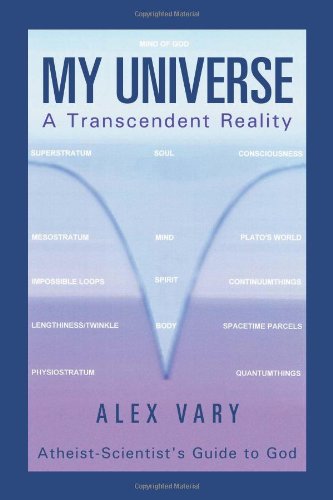Book review: My Universe, A Transcendent Reality
by Alex Vary
★★★★
The subtitle of this book is an “Atheist-Scientist’s Guide to God.” It’s broken down into five parts of two or three dozen short essays each, which were compiled and organized by Vary over a period of six years. Each essay leads fluidly into the next, however, so it’s not as if Vary is publishing an anthology; this is, rather, a defense of his particular view of reality … a reality that transcends the material cosmos into the transcendental universe. Vary takes what he calls a “rational approach” to God, along the lines of thinkers Bernard Haisch, Paul Davies and Jacob Needleman, and much of his book details his perception of body-soul-spirit. The mind of “God” (in which we, with our limited minds, share) resides outside the physical cosmos.
Vary’s writing is intelligent and he’s extremely well-read. He is a retired research scientist with NASA, and I have to be honest, here: He’s way over my head at times. Part three, the central portion of the book, is simply incomprehensible. I can speak somewhat knowledgeably about quantum entanglement, black holes, and particle-wave duality, but if asked whether Vary adequately argues his hypotheses (among them, an explanation of how the material somethingness of the cosmos arises from nothingness) or whether he has truly formulated a convincing proof of Fermat’s Last Theorem, I admit total bafflement.
A key part of Vary’s worldview includes what he refers to as Astrals, non-corporal beings that reside in the mesostratum. Spiritual manifestations with human-like traits, personalities, occupations and ambitions, who tinker in material affairs, fiddling with DNA, fine-tuning our evolution. How else do we explain how species seem to appear suddenly, fully formed and equipped with all sorts of specialized organs, then remain stable for millions of years? Yeah, I know, this stuff is out there, but once we dig below Vary’s tongue-in-cheek caricatures of our designers, he turns out to be quite serious. So, clearly, his is a controversial take.
And also a bit disturbing, since it implies that we humans, like the dinosaurs, are most likely still imperfect beings who will soon be discarded as non-working models while the DNA tinkering continues.
Honestly? I had a lot of fun reading this one. I highly recommend it for pleasurable reading and fascinating learning. But I don’t think I have room for Vary’s “religion.”












 354 Circles
354 Circles
 603 Goodreads Friends & Fans
603 Goodreads Friends & Fans

 Hello! I'm an author, historical Jesus scholar, book reviewer, and liberal Christian, which means I appreciate and attempt to exercise the humanitarian teachings of Jesus without getting hung up on any particular supernatural or religious beliefs.
The Bible is a magnificent book that has inspired and spiritually fed generations for thousands of years, and each new century seems to bring a deeper understanding of life’s purpose. This is true of not only Christianity; through the years, our age-old religions are slowly transforming from superstitious rituals into humanitarian philosophies. In short, we are growing up, and I am thrilled to be riding the wave.
I avidly read all thought-provoking religion titles. New authors: I'd love to read and review your book!
Hello! I'm an author, historical Jesus scholar, book reviewer, and liberal Christian, which means I appreciate and attempt to exercise the humanitarian teachings of Jesus without getting hung up on any particular supernatural or religious beliefs.
The Bible is a magnificent book that has inspired and spiritually fed generations for thousands of years, and each new century seems to bring a deeper understanding of life’s purpose. This is true of not only Christianity; through the years, our age-old religions are slowly transforming from superstitious rituals into humanitarian philosophies. In short, we are growing up, and I am thrilled to be riding the wave.
I avidly read all thought-provoking religion titles. New authors: I'd love to read and review your book!
 Hi! While Lee writes the articles and reviews the books, I edit, organize, and maintain the blog. The views expressed here are Lee's but I'm his biggest supporter! :-)
Hi! While Lee writes the articles and reviews the books, I edit, organize, and maintain the blog. The views expressed here are Lee's but I'm his biggest supporter! :-)
Connect With Me!